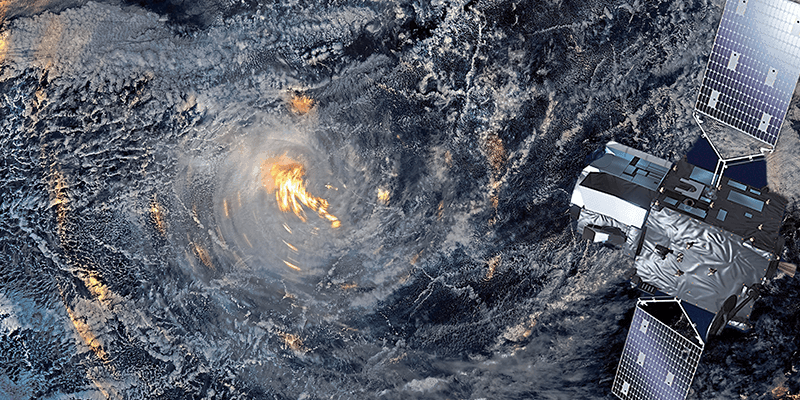Launched earlier this year, the UK Earth Observation Climate Information Service (EOCIS) will see the National Centre for Earth Observation (NCEO) leading a consortium of world-renowned, UK research institutions to address the climate emergency

EOCIS is a new national project funded by the UK government through the Natural Environment Research Council (NERC) that will, for the first time, enable the UK to create, maintain and expand regional and global climate data from space through its own service.
First of its kind
The first of its kind in the UK, the programme will deliver up-to-date research leading to critical data for understanding the climate in the UK, regionally and globally. Key datasets produced will include the surface temperature of the UK including cities, the health of our lakes and coastal waters and the productivity and resilience of vegetation.
Other research will capture methane change across northern Europe and Asia. UK scientists are world leaders in sea surface temperature, polar ice change, fire emissions and polluting gas concentrations.
EOCIS will maintain and grow the UK’s reputation for excellence in exploiting space for climate science, contributing to the UK’s aspirations as a science superpower. EOCIS will enable the UK to operate its own climate data supply chain and develop new UK-focussed opportunities to support UK science, policy making and the response to UK Net Zero objectives.
Earth Observations (EO) from space capture critically valuable measurements of the climate for the UK and worldwide. The EOCIS aims to transform these EO measurements into information usable for world-class science, climate services and decision support for policymakers.
Trustworthy data will enable action to be taken on heatwaves, urban flooding and the health of coastal waters. EOCIS will create climate information to increase knowledge about issues ranging from polar ice change, to landscape carbon, to drought impacts on food security.
Partners
Building on the UK-wide Space 4 Climate group, the EOCIS consortium involves some of the UK’s most prestigious research institutions for climate and earth systems. These include the University of Reading, University of Leicester, Plymouth Marine Laboratory (PML), the University of Edinburgh, University of Leeds, University College London, Rutherford Appleton Laboratory (RAL), and King’s College London. They will be supported by colleagues from the National Physical Laboratory (NPL), the Centre for Polar Observation and Modelling, the University of Southampton and Bangor University. Assimila Ltd of Reading has been contracted to provide initial project management services.
Commenting on the move, Minister of State at the new UK Department for Science, Innovation & Technology, George Freeman said, “Earth Observation is vital for how we see and understand our own planet, from biodiversity through to climate change with more than half of key climate data coming from space.
“The UK is at the forefront of this technology and know-how. The UK EO Climate Information Service will bring together world-leading scientific expertise from across the country to bring our view of Earth into even deeper focus.”
Professor Chris Merchant, scientific lead of EOCIS and an NCEO climate data expert at the University of Reading, said, “The EOCIS will enable many talented scientists all across the UK to work together, creating information needed to respond to the climate crisis. The new climate data from EOCIS will be used to better understand growing climate risks and how to respond to them.
“We’ll see new and better climate data from space, for the UK and the world. And we’ll see innovation around getting that information readily into the hands of people who need to use it.”
Impact
Over the coming months, EOCIS will establish a service online where its climate information will be made freely available to all. Innovation through the project will increase the scope of that service and make climate information more accessible in new forms. The impacts of EOCIS will include advances in climate science, an engaged commercial sector supported to innovate in this sector, and better-informed decisions for climate resilience in the UK.
To maximise the impact of EOCIS, the consortium will complement and collaborate with others meeting the need for climate information: nationally and internationally, and across science, commerce and policy.
Context
The UK Government recently announced funding for NERC of over £19 million for key EO and climate services, data facilities and skills. The EOCIS is one of two NCEO-led national projects which will support UK scientists to produce new and more accurate climate data from space with unique facilities for data access and processing. The projects are overseen by Professor John Remedios, Executive Director of NCEO at University of Leicester.
The EOCIS has been funded by the Natural Environment Research Council (NERC) through the Earth Observation Investment Programme, with national project funding being provided by the Department for Science, Innovation and Technology.
The National Centre for Earth Observation (NCEO) provides the UK’s Natural Environment Research Council (NERC) with national capability in Earth Observation science – monitoring the health of our planet through satellite instruments and with world-class capability in interpreting this data. It is made up of more than 130 scientists from top universities and research organisations across the UK, with Professor John Remedios leading the NCEO at the University of Leicester. https://www.nceo.ac.uk/ ;
Chaired by the UK Space Agency, Space4Climate builds on the UK’s trusted expertise in climate data. The group’s activities enable a seamless supply chain of climate data from space assets, help identify climate services user requirements, and facilitate climate services development for global economic and societal benefit. https://space4climate.com/ ;
The Natural Environment Research Council (NERC) is the driving force of investment in environmental science in the UK, and is part of UKRI. NERC advances the frontier of environmental science by commissioning new research, infrastructure and training that delivers valuable scientific breakthroughs. https://nerc.ukri.org/


